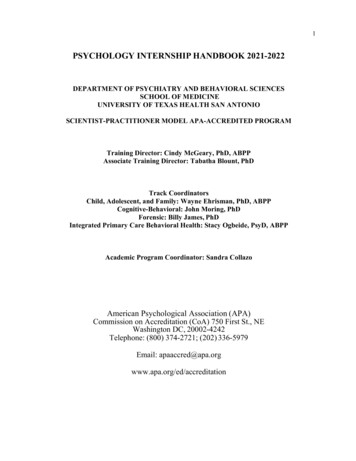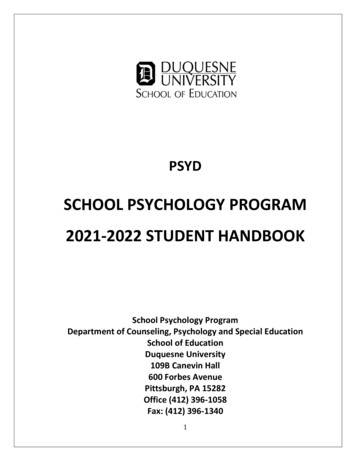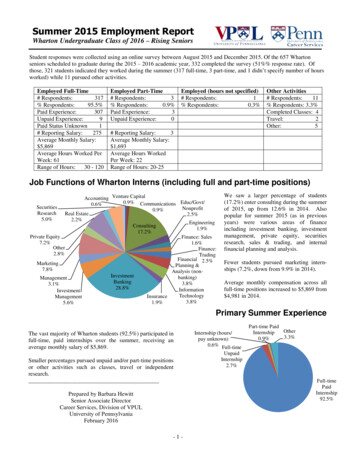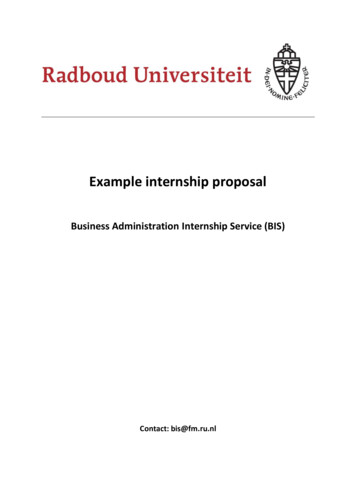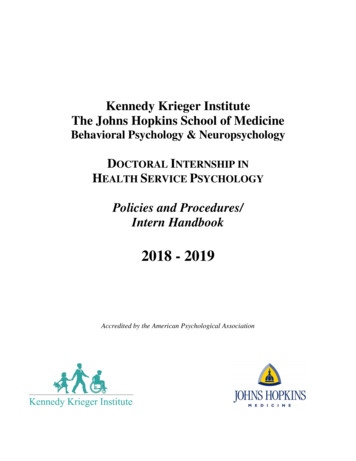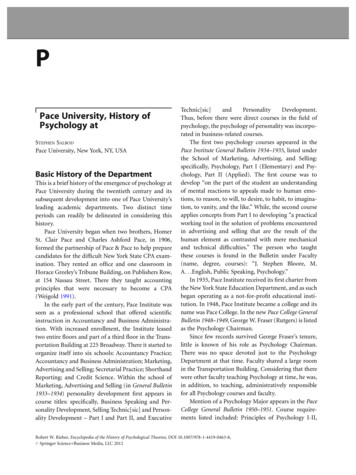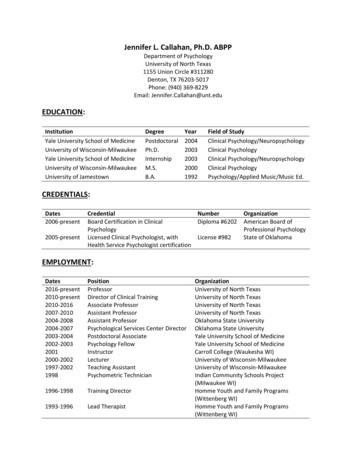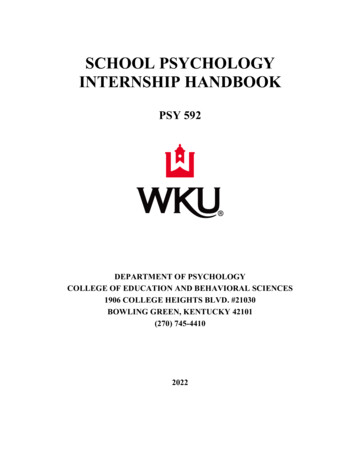
Transcription
SCHOOL PSYCHOLOGYINTERNSHIP HANDBOOKPSY 592DEPARTMENT OF PSYCHOLOGYCOLLEGE OF EDUCATION AND BEHAVIORAL SCIENCES1906 COLLEGE HEIGHTS BLVD. #21030BOWLING GREEN, KENTUCKY 42101(270) 745-44102022
TABLE OF CONTENTSI.Introduction 1A. Program Description and Courses 1B. Program Philosophy 2C. Student Orientation to Educational Process 3D. Graduates: Expected Competencies Overview 3E. References 4II. Overview of Internship Guidelines 5A. Purposes and Goals of School Psychology Internship 5B. Preparation for Internship 6C. Site Selection 7D. Supervisory Personnel 81. Primary Field Supervisor . 82. University Supervisor 9E. Intern Responsibilities 10III. Suggested Intern Orientation Activities 12IV. Internship Portfolio Content and Forms 14A. Summary of Content . 14Portfolio Summary Sheet 17Internship Professional Development Plan 18Sample Internship Professional Development Plan 19Professional Development Plan Scoring Rubric 22Documentation of Various Internship Activities 24Psychoeducational Report Scoring Rubric 30Consultation Case Scoring Rubric 32Academic and Behavioral Intervention Scoring Rubric 34Goal Attainment Scaling (GAS) form 37Intern Evaluation of Supervision and Internship . 38Sample Letter of Agreement 40Internship Completion Form 43Evaluation of Competency Development 44B. Guidelines for Completing Time Logs . 501. Internship Weekly Time Log . 522. Monthly Summary of Internship Activities 53V. Time Frames for Important Internship Tasks 54
1THE SCHOOL PSYCHOLOGY INTERNSHIPI. INTRODUCTIONThe purpose of this handbook is to provide guidelines for persons participating in theschool psychology internship experience, Psychology 592, at Western Kentucky University. TheSchool Psychology Program at Western Kentucky University encompasses a three-year programof graduate study developed to meet the standards promoted by the professional organizationsfor school psychologists. These accrediting and professional organizations are the NationalAssociation of School Psychologists (NASP) and the Council for the Accreditation of EducatorPreparation (CAEP), formerly known as NCATE. The School Psychology program has beenNASP approved and CAEP/NCATE accredited since 1993.A. Program Description and CoursesThe School Psychology graduate program consists of a sequence of course workculminating in the Specialist in Education (Ed.S.) degree. The program consists of 66 graduatehours and usually requires three years of full-time commitment to complete. The programprovides students with a solid core of psychological foundations including the areas of learningtheory, educational psychology, research methods and statistics. Students also participate inapplied coursework including academic assessment and intervention, consultation, programevaluation, functional behavioral assessment, and psychological assessment. This preparationprovides the student with a broad array of skills to deliver psychological services in diverseeducational settings. These services include: individual child evaluations, program evaluation,consultation, counseling, and academic & behavioral interventions. The school psychologyprogram's broad goal is to train school psychologists who are able to integrate theoreticalinformation from the fields of psychology and education, so they can develop appropriateinterventions for children, parents, and teachers in a wide variety of educational settings.The following is a list of courses taken by students in the Specialist in Education - SchoolPsychology program:Foundations of School PsychologyAdvanced Educational PsychologyPsychology of LearningProgram Evaluation and Research MethodsPsychological Perspectives on Classroom BehaviorBehavior Problems of Childhood and AdolescenceProfessional Issues and Ethics in PsychologyClinical Child Psychology: Theory and PracticeAssessment of Individual Intellectual FunctioningAdvanced Assessment in Educational SettingsPracticum in Psychological AssessmentSeminar in School PsychologyTheories of PsychotherapyAcademic Assessment and InterventionConsultation in Educational and Mental Health SettingsReading and Understanding Statistics in PsychologyPracticum in Psychology – Field PlacementSpecialist ProjectPsychology Internship
2B. Program PhilosophySchool psychology services need to be tailored to the needs of each child and each situation,while being aware of multiculturalism in the schools (Malone & Ishmail, 2020). No matter whatthe role, a school psychologist must be able to evaluate a situation and problem-solve solutions.“Thus, the problem-solving model uses the scientific method to determine what works ” (Merrellet al., 2012, p. 159). The WKU school psychology program emphasizes the role of the schoolpsychologist as that of a problem solver who relies upon data-based decision-making (Harrison &Thomas, 2014; Shinn & Walker, 2010; Ysseldyke et al., 2006). Ysseldyke et al. (2006) stated:“School psychologists should work to: (a) improve competencies for all students, and (b)build and maintain the capacities of systems to meet the needs of all students as they traversethe path to successful adulthood” (p. 12)"Knowledge alone will not suffice. School psychologists must also possess a set of skills,including the ability to use problem-solving and scientific methodology to create, evaluate,and apply appropriate empirically validated interventions at both an individual and systemslevel" (p. 14).WKU school psychology students are trained to use a problem-solving model and databased decision-making to guide their practice, meaning they identify problems and applyassessment, consultation and intervention strategies to resolve them (Erchul & Fischer, 2018).Furthermore, such intervention strategies need to be evidence-based (Burns et al., 2017). Theproblem-solving process involves a series of steps that enable the school psychologist to defineand clarify the problem, analyze the environment and critical elements of the problem, brainstormalternatives, select a strategy, implement it, evaluate the outcomes, and disseminate the results.Integrating the problem solver philosophy with the knowledge base provides training to ensure abroad-based service provider who can serve the psychological and mental health needs for allchildren in various educational settings. It is this combination of knowledge and applied skills thatallow school psychologists to generate evidence-based solutions to the complex problems foundin educational settings today.Training requires flexibility and creativity by both faculty and students to adapt to theconstantly changing problems of contemporary educational systems (Bear & Minke, 2006; Fagan& Wise, 2007; Harrison & Thomas, 2014; Ysseldyke et al., 2006). The school psychologyprogram recognizes the importance of training school psychologists to understand culture andethnicity factors and to consider these factors in the problem-solving model (Hamayan et al., 2013;Kressler et al., 2020; Malone & Ishmail, 2020; Rhodes et al., 2005). Students within educationalenvironments have become increasingly more diverse in values, beliefs, primary language, andcultural background. Through training, school psychologists become more sensitive to diversityof values, interactional styles, and cultural expectations. As cultural diversity is considered toinfluence many aspects of interpersonal and individual behavior, it is considered best to addressthe topic through many of the courses that comprise WKU's school psychology program. Theskills regarded as necessary for multicultural intervention and assessment are those values andcompetencies emphasized by Jacob et al., (2016) and the National Association of SchoolPsychologist’s (NASP) Principles for Professional Ethics (2020). As an example of that emphasis,Guiding Principle I.3. of our ethical principles states:In their words and actions, school psychologists promote fairness and social justice.They use their expertise to cultivate school climates that are safe, welcoming, andequitable to all persons regardless of actual or perceived characteristics, includingrace, ethnicity, color, religion, ancestry, national origin, immigration status,socioeconomic status, primary language, gender, sexual orientation, gender
3identity, gender expression, disability, or any other distinguishing characteristics.(NASP, 2020, p. 44)C. Student Orientation to Educational ProcessThe WKU School Psychology Program emphasizes the importance of being familiar witheducational settings. During the first year of course work, students become familiar with theeducation process through coursework and class discussion. Students are exposed to the variousroles and educational settings in which school psychologists work. Students learn how schoolpsychologists work with other professionals within the schools or outside agencies, withfamilies, and the community at large.In addition to coursework in the second year of the program, students obtain assessmentand intervention skills within educational settings. They participate in a field placement within apublic school system, one day per week for the school year (minimum of 200 hours). Eachstudent is paired with a practicing school psychologist for a planned sequence of experienceswithin the school setting. This sequence starts with activities such as observation of classrooms,conferences, and special education meetings, while gradually increasing the student’sresponsibilities and activities throughout the year, culminating in a wide variety of services undersupervision (assessments, direct and indirect interventions, and parent/teacher conferences). Thepracticing school psychologist assists in student evaluation and monitoring, with universityfaculty maintaining primary responsibility for supervision. The third year of the programconsists of a full academic year of supervised internship experience that is described in thishandbook.D. Graduates: Expected Competencies OverviewWKU school psychology program graduates are required to be competent in many areas.An overview of competencies can be summarized within the following areas:1. Integrating knowledge and skills in psychology while providing direct services tochildren, youth, parents, and teachers. This includes assessment linked with appropriateacademic and behavioral intervention strategies.2. Supplying indirect services and interventions to children, parents, teachers and othereducational personnel through consultation, program development, continuing educationtraining, and applied research and program evaluation.3. Displaying an orientation as a problem solver, change agent, and advocate. Thisorientation is evidenced by activities in practicum and internship, as well as in thephilosophy of the school psychologist.4. Demonstrating an orientation as a consultant and mental health resource person throughidentifying and meeting the mental health, learning, and overall educational needs ofindividuals and educational systems.5. Acting as a positive role model by modeling sensitivity to academic and emotional needs,individual differences, and cultural diversity. Advocating a strong set of beliefs in anindividual's worth by championing all individuals’ rights to an appropriate education.The competencies, outcomes, and curriculum of the program are selected to achieve andmeasure the program philosophy - problem-solving - that relies upon data-based decisionmaking. The sequence of courses is planned so that the development of new knowledge andskills builds upon previous coursework and experiences. Faculty periodically review andevaluate this link from philosophy to expected outcomes to ensure that the curriculum is relevantand current.
4E. ReferencesBear, G. G., & Minke, K. M. (2006). Children’s needs III: Development, prevention, andintervention. National Association of School Psychologists.Burns, M. K., Riley-Tillman, T. C., & Rathvon, N. (2017). Effective school interventions:Evidence-based strategies for improving student outcomes (3rd ed.). Guilford Press.Erchul, W. P., & Fischer, A. J. (2018). Consultation. In S. L. Grapin & J. H. Kranzler (Eds.),School psychology: Professional issues and practices (pp. 181-195). Springer.Fagan, T. K., & Wise, P. S. (2007). School psychology: Past, present, and future (3rd ed.).National Association of School Psychologists.Guiney, M. C. (2019). The school psychology supervisor’s toolkit. Routledge.Harrison, P., & Thomas, A. (Eds.). (2014). Best practices in school psychology (4-volume set).National Association of School Psychologists.Hamayan, E., Marler, B., Sanchez-Lopez, C., & Damico, J. (2013). Special educationconsiderations for English Language Learners: Delivering a continuum of services (2nded.). Carlson Publishing.Jacob, S., Decker, D. M., & Lugg, E. T. (2016). Ethics and law for school psychologists (7th ed.).John Wiley & Sons.Kressler, B., Chapman, L. A., Kunkel, A., & Hovey, K. A. (2020). Culturally responsive databased decision making in high school settings. Intervention in School and Clinic, 55, 214220.Malone, C. M. & Ishmail, K. Z. (2020). A snapshot of multicultural training in schoolpsychology. Psychology in the Schools, 57, 1022-1039.Merrell, K. W., Ervin, R. A., & Peacock, G. G. (2012). School psychology for the 21st century:Foundations and practices (2nd ed.). Guilford Press.National Association of School Psychologists. (2020). The professional standards of theNational Association of School Psychologists. Author.Rhodes, R. L., Ochoa, S. H., & Ortiz, S. O. (2005). Assessing culturally and linguisticallydiverse students: A practical guide. Guilford Press.Shinn, M. R., & Walker, H. M. (2010). Interventions for achievement and behavior problems ina three-tier model including RTI. National Association of School Psychologists.Ysseldyke, J., Burns, M., Dawson, P., Kelley, B., Morrison, D., Ortiz, S., Rosenfield, S., &Telzrow, C. (2006). School psychology: A blueprint for training and practice- III.National Association of School Psychologists.
5II. OVERVIEW OF INTERNSHIP GUIDELINESThe School Psychology Program Internship is a required experience that comes at the endof coursework and practicum experiences. The purpose of the internship is to assist the student inintegrating prior training experiences by means of practical application in educational settings.Students are also afforded the opportunity to develop a professional identity and move towardassumption of the role of a school psychologist through the internship. Additionally, theinternship provides students and supervisors with the opportunity to evaluate student skills andknowledge within a controlled, supervised setting. The policies outlined within this handbookare designed to be consistent with the standards for internship of the accrediting institutions(NASP and CAEP).The school psychology internship is a cooperative venture carried out by the SchoolPsychology Program of Western Kentucky University and a local education agency (LEA).While the responsibility for the field experience is shared between the cooperating school districtand WKU, the LEA must be willing to allow the program faculty to guide aspects of theinternship such as the type and variety of experiences offered the student, the length of theexperience, and selection of the on-site supervisor. At times, special attention is needed to matchthe needs of the individual intern with the characteristics of the primary supervisor and/or theinternship site. The internship experience must be comprehensive and well balanced in roles andfunctions for developing school psychologists. The internship should NOT be seen as a primarymeans for a school district to gain assistance with testing children.The internship is a planned terminal, summative and integrative experience as per NASPguidelines. To obtain program approval for internship, the graduate student must have completedat least 54 graduate course hours, including a one-year, part-time, field experience sequence.The internship occurs on a full-time basis (one academic year 10 months) and consists ofa minimum of 1,200 clock hours, with at least 600 hours within a school setting. The schoolpsychology student, with faculty and advisor permission, can take two consecutive years on ahalf-time basis to complete the internship. This latter provision is the exception rather thanstandard procedure. While at least 600 hours must be completed in a school based setting, othersettings for the additional 600 hours may be arranged, with faculty advisement and approval,depending on the availability of appropriate training sites (e.g., a licensed psychologist availableto supervise) and the student's professional development and future goals.Practically all WKU graduates have completed their entire internship year in the publicschools. Student interns are typically employed under 10-month contracts that result inapproximately 1,400 hours of service. Because students are under contract with the school, theyare expected to finish out the school year at their internship site and continue to complete alluniversity internship requirements, even if their 1,200 hours are completed before the schoolyear is over. A total of six graduate hours of credit is awarded with students registering for PSY592. Students must register for three (3) credit hours of PSY 592 per semester while onInternship.A. Purposes and Goals of the School Psychology Internship1.To gain experience in the problem-solving model and with data-based decisionmaking with all aspects of a school psychologist’s role with both regular andspecial education students.2.To provide an opportunity to refine consultation skills with parents, teacher,special service personnel in schools, school administrators, and personnel fromother community agencies.
63.4.5.6.7.8.9.10.To refine psychoeducational diagnostic and intervention skills.To gain an overview of the public school as an organization, including itsrelationship to other societal agencies, its policies, personnel, etc.To develop sensitivity to classroom and school culture and factors influencing theclassroom environment.To develop an understanding of the role of preventive mental health in schoolprograms.To gain experience with an interdisciplinary team approach to child study and theMulti-Tier System of Supports (MTSS)/Response to Intervention (RTI) process.To be exposed to the implications of legal constraints and legislative initiatives onschool psychology practice.To provide the opportunity to apply theoretical knowledge to the educationalsystem and problem-solving process.To practice ethically within the guidelines of NASP and to follow state andfederal educational law and local district policies and procedures.B. Preparation for InternshipFor students with internships in Kentucky, students must apply for and obtain Kentuckyschool psychology (one-year) certification during the summer before the internship begins. Theprocedure for obtaining initial certification within Kentucky involves the following steps:1.During the second year in the program, all students (even if completing theinternship outside of Kentucky) apply for and take the PRAXIS Specialty Exam School Psychologist (Test # 5402). Students are advised to take the exam in theSpring semester (usually January) before the internship year. A score of 147 orabove on the Praxis Specialty Exam is required in Kentucky for certification.National certification (NCSP) by NASP also requires a passing score of 147.2.Immediately after completing the Spring semester of the student's second year,each student should apply for Kentucky certification. Students will need tocomplete the online form, Form CA-1, available on the Education ProfessionalStandards Board website: www.epsb.ky.govThis form must be completed for the One (1) year certificate (no cost). In the“Type of Certificate Requested” area, check the “Statement of Eligibility” boxand type in “School Psychology” in the blank space. Each student will also needto request the Registrar's Office to send an official transcript to the Office ofProfessional Educator Services (GRH 1092). Interns are usually considered tohave Rank II Certification (& pay) in Kentucky. They will be eligible to applyfor Rank I Certification after graduating or completing the programrequirements (by re-completing the same CA-1 form but paying the “Issuance,reissuance, or renewal of regular certificate” fee).3.During the internship year, students must continue their professional practiceliability insurance coverage and provide to the university internship supervisor acopy of the Letter of Coverage issued with the policy. Insurance coverage isavailable through companies affiliated with NASP for its members.
7Students applying for internship in states other than Kentucky will need to determinecertification requirements for that state. Some states do not require certification for internshipsin school psychology. The student is responsible for obtaining the necessary credentialinginformation and paperwork from other states. All sites need to be approved by the UniversityIntern Supervisor before final acceptance of the site and internship.In addition to obtaining the necessary credentials, students must have evidencedsatisfactory progress in the School Psychology program coursework and development of thenecessary professional and interpersonal skills. Any documented weaknesses or deficiencies willneed to be satisfactorily met before program approval for the internship will be granted.Procedures for evaluating student progress and remediating weaknesses are documented withinthe Handbook for Graduate Students in School Psychology.C. Site SelectionThe approval of an internship site is primarily based upon the site's ability to meet thetraining needs of the internship. However, the needs of the school district must also be taken intoconsideration. The internship program should not simply be a “test and place” experience.No more than 50 traditional comprehensive diagnostic (eligibility) assessments per year arerecommended. It is expected that the internship experiences be comprehensive and wellbalanced in the roles and functions of school psychologists.The following considerations provide the general criteria for intern placement:1.Supervision - There should be one individual in the schools directly responsiblefor the supervision of the intern. This on-site supervisor shall be responsible forno more than two (2) interns total. This on-site supervisor must have at least three(3) years of experience as a school psychologist (post-internship) and must holdstandard certification as a school psychologist by the Kentucky Department ofEducation (or other appropriate state certification if out of state) and/or licensurein school or clinical psychology by the State Board of Psychology. It is theresponsibility of the school district to have the prospective on-site supervisor senda copy of certification/ licensure to the university supervisor.2.Facilities - Internship sites must provide interns with the appropriate materials,clerical assistance, and office space consistent with that afforded other schoolpsychologists within the district. The school district should also reimburse theintern for mileage, and other professional expenses as applicable.The internship site must sign a letter of agreement (sample on pp. 40-42) that brieflysummarizes the policies explained in this manual. This letter highlights the requirements of theinternship. The internship site must agree to allow the student to attend or participate in seminarmeetings held at WKU, typically three to four times each semester. If the student is not withindriving distance of WKU, or electronic meetings are held in lieu of in-person meetings, theinternship site must agree to allow the student to participate in the meeting via electronic means(e.g., Zoom). These meeting days should be considered as regular workdays. In addition, internsmay be working on their Specialist Project during the internship year. Some students may designand implement their research project during their internship. Data collection, library research,meeting with committee faculty, and writing required for the project are considered legitimateinternship activities. The general guideline of allowing one to two days per month for suchresearch activities is recommended, if needed by the intern.
8D. Supervisory PersonnelSupervision is a joint responsibility of the University Supervisor of Internship (schoolpsychology trainer) and the on-site Primary Field Supervisor (on-site supervising schoolpsychologist).1.Primary Field Supervisor - This is the field supervisor, or on-site supervisingschool psychologist. The supervisor is the intern's mentor and professional rolemodel, as well as the one who is responsible for the administrative welfare of theintern. If a qualified supervisor is not available within the school district, theuniversity supervisor will assist the district in locating a qualified supervisor whocould be employed for the purpose of supervision. It is the school district'sresponsibility to obtain a supervisor acceptable to the university program. Anyfees for off-site supervision must be paid by the school district. All Primary FieldSupervisors should hold interns to a high level of professional excellence, as wellas a high level of integration and efficiency in completing paper work and servicedelivery. It is believed that the student provides a sufficient amount of service towarrant the release of a supervisor from regular duties or case load for the timerequired for supervision activities. The school district is strongly encouraged toconsider modifications in the Primary Field Supervisor's responsibilities to coverthe internship supervisory requirements.Primary Field Supervisor Responsibilities:tCoordinate the internship program with the school district's administratorsand Western Kentucky University Internship Supervisor.tPlan a sequence of activities and experiences that will orient the intern tothe school district. Examples of orientation activities are included onpages 12-13. This orientation should encompass a period of time at thebeginning of the internship. Orientation activities also include thedevelopment of the long-range goals and objectives for the internship yearfor the Internship Professional Development Plan (pp. 18-21). The internis responsible for developing the Professional Development Plan inconjunction with the Primary Field Supervisor and is approved by theUniversity Supervisor.tProvide weekly face-to-face supervision for a minimum of two (2) hours.Supervision activities should include discussions of progress, review ofreports and paperwork, protocol reviews, and direct observation of theintern's activities. In addition, supervision should be provided indevelopment of professional identity and adjustment to the demands of thejob roles. The Primary Field Supervisor is responsible for evaluating andapproving through a co-signature all written reports. The student is to signtheir reports as “School Psychology Intern.”tAssist the intern in developing monitoring/organizational skills needed inthe delivery of psychological services. This assistance might include flowcharts or check sheets for the status of a referral, due process check lists,etc. This might also include techniques to increase efficiency in reportwriting, test scoring, and managing workloads.tMonitor the intern's activities and coordinate experiences across the school
9year so that the intern is able to meet the expectations of the internship.The Documentation of Various Internship Activities form, found on pages24-29, provide a wide range of experiences designed to meet NASPtraining requirements. Monitoring of activities will also involvemonitoring the accuracy of the intern's weekly and monthly logs of timeand activities.2.tParticipate in periodic communication with the University Supervisor.Open lines of communication among all those involved in the internship isessential to provide maximum benefit to the intern, prevent problems fromarising or escalating, and assure that expectations for supervision are beingmet. The University Supervisor will assume the responsibility forinitiating routine phone and/or email contacts. However, it is the PrimaryField Supervisor's responsibility to contact and inform the UniversitySupervisor of any issues/concerns as they arise (e.g., ethical problems,difficulties in role/job performance). The University Supervisor is alsoavailable to assist in developing plans or strategies for supervision of theintern and deal with any identified problems/issues.tParticipate in periodic evaluation of the intern. The Primary FieldSupervisor will be asked to evaluate the intern's performance inDecember and again in May of the internship year (pp. 44-49).Assignment of a grade for the internship will be a joint effort between theUniversity Supervisor and the Primary Field Supervisor. The gradereflects competency in the activities listed, effectiveness in working withschool staff, and assumption of the role of school psychologist. ThePrimary Field Supervisor will also be asked to discuss their evaluationwith the intern.tSubmit the Internship Completion Form at the completion of theinternship. The form is to verify minimum clock hours (over 1,200) weremet along with a
school psychology internship handbook psy 592 department of psychology college of education and behavioral sciences 1906 college heights blvd. #21030 bowlin
